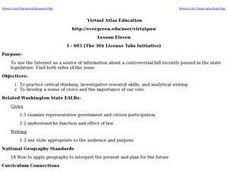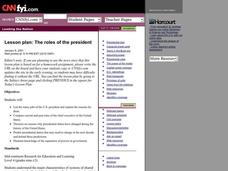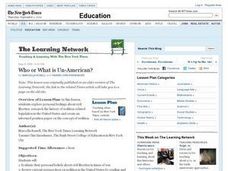National Endowment for the Humanities
Ratifying the Constitution
Ratifying the Constitution was no simple task. Using primary sources, such as classic writings from the Federalists and Anti-Federalists, young scholars examine the arguments for and against the Constitution. They then decide: Would they...
C-SPAN
14th Amendment Equal Protection Clause
Two Supreme Court cases, Plessy v. Ferguson and Brown v. Board of Education take center stage in a lesson about the Equal Protection Clause of the 14th Amendment. Class members research both cases to compare and contrast the rulings.
C-SPAN
Primary and Secondary Sources: Trailblazers in Congress
Trailblazers forge the path into uncharted territory, they establish a precedent for others to follow. Young historians research trailblazers in Congress using primary and secondary sources to profile outliers that changed the face of...
Curated OER
James Madison: From Father of the Constitution to President
Students investigate reasons why James Madison is called the "Father of the Constitution." They discuss three events during his presidency that raised constitutional questions and look at Madison's opinions of those questions. They...
Curated OER
The Supremes
Students discuss steps cases go through to reach Supreme Court, examine Bill of Rights, and rank rights in order of importance to them. Students then research Supreme Court case dealing with one of first ten amendments, and write about...
Curated OER
Brown v. Board of Education of Topeka
Twelfth graders explore desegregation as it occurred at various stages in United States history. They specifically chronicle the role of South Carolina in the desegregation case of Brown v. Board of Education.
Curated OER
I 695 (The 30$ License Tabs Initiative)
Students research the bill I 695 issue. They discuss the topic before they research the issue of I 695. Students discuss how new laws are always being created and the differences in opinion about these laws. They see how this initiative...
US House of Representatives
House History Comes Alive
How reliable is oral history? The resource uses the oral history website to help academics understand the pros and cons of using recollections to teach others. Scholars complete a worksheet, draft a letter to a representative, and...
Curated OER
The Roles of the President
Students list the many jobs of the U.S. president and explain the reasons for them. They compare current and past roles of the chief executive of the United States.
PBS
Civic Engagement and How Students Can Get Involved
There is no age limit on civic engagement. Even if your pupils are not old enough to vote, they are old enough to get involved. Show them how with a PBS lesson that underscores the importance of civic participation and models ways young...
Curated OER
Telegram from Senator Joseph McCarthy to President Harry S. Truman
Students research the McCarthy hearings to determine the following: time frame of hearings, how they were broadcast, how the press reacted, and how the American people reacted in light of the Korean Conflict and the Cold War.
Curated OER
Who or What is Un-American?
Students explore concepts about civil liberties, research the history of sedition-related legislation in the U.S. and create a position paper on the topic.
Curated OER
Capitol vs. Capital
Students construct time lines to show the order of significant events in Ohio history. They explain how Ohio progressed from territory to statehood.
Curated OER
District Decisions
Students review census data and examine the manner in which reapportionment and redistricting occurs. They, in groups, debate a proposed change in the way congressional districts are drawn and present their debates to the class.















